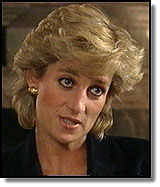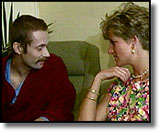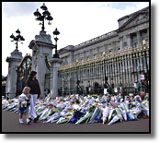
|
A Week of Remembrance
When the first reports came in of the death of Diana, Princess of Wales, most of Britain was sleeping, unaware of the tragedy.By the time the British heard the news, a lot of the rest of the world already knew and had started trying to explain exactly what the Princess had meant to them.
The UK soon joined in paying its tributes, and did so with a fervour and intensity which took many people back. Ordinary people -- the kind of people Diana had met on countless walkabouts -- saw their tributes join those of presidents, prime ministers and celebrities.
From all around the world came heartfelt tributes from leaders, many of whom had met the Princess several times. American President, Bill Clinton, said he was "profoundly saddened", and South African President, Nelson Mandela, said the death was "a loss to all her adoring fans".
British political leaders and figures led the country's tributes which were reflected in all parts of the UK.
Yet one comment which caught many people's imagination came not from a politician but a comedian. Billy Connolly told the BBC that he did not realise how much he had liked Diana until she was gone.
Throughout the day crowds barely able to believe the news went, stunned, to stand outside Buckingham Palace and outside Diana's official residence, Kensington Palace. Thousands of bouquets with messages of remembrance were laid. One -- typical of the mood of the day -- read: "Born a lady, Became a Princess, Died a legend."

|
| Diana meeting an AIDS patient |
The welter of charities she had supported over the 16 years of her public life, and which were so dear to her heart, began to articulate the practical lifeline she had given them, aside from her emotional backing.
Suggestions were made as to how a lasting memorial to Diana could be made. While some favoured a permanent visual memorial such as a statue, others felt Diana's commitment to charity and caring would be better reflected in other ways. So many offers of donations flooded in to the Princess's charities, Buckingham Palace announced that the Diana, Princess of Wales, Memorial Fund would be set up.

|
| Thousands of floral tributes at Buckingham Palace |
The public show of emotion continued unabated, however, and queues started forming at St James's Palace to sign books of condolence. The more people queued and the more books that were made available, the more people seemed to want to take part. Waiting times to sign of up to 12 hours were reported.
Books of Condolence were also placed in British embassies and consulates around the world. The Internet also saw a huge amount of information flowing about the death and people's reactions to it.The Royal Family's website was inundated with messages from around the world, as was Politics97.
The worlds of commerce and sport said they would support a shutdown in memory of the princess. Sporting events were cancelled, shops and fast food outlets said they would remain closed until after the funeral was over. The Scottish Football Association, which had been planning to go ahead with a World Cup qualifying fixture against Byelorussia at 3pm on Saturday, announced it was postponing the match until Sunday.
British tennis player Gred Rusedski joined Andre Agassi in wearing a black ribbon while playing in the US Open in New York, evoking memories of the red ribbons worn to highlight AIDS and HIV.
With up to two million people expected to travel to central London to watch the funeral cortege, it was clear that the simple act of attendance would be their chosen act of remembrance.


